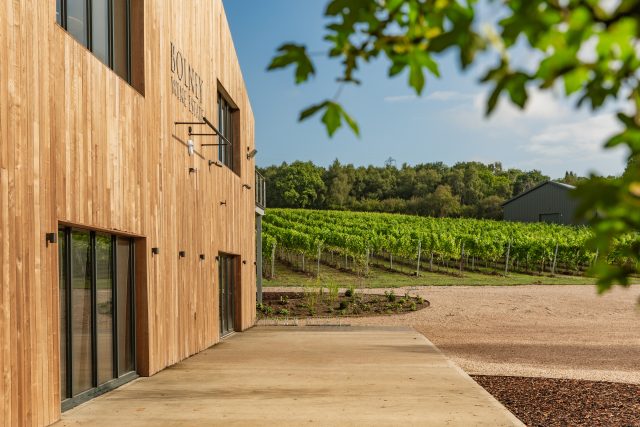Bolney Wine Estate’s James Davis MW on duty changes, English sparkling and future opportunities
James Davis MW, general manager of Bolney Wine Estate, shares exclusive insights into how the new alcohol duty structure, shifting consumer preferences and evolving climatic conditions are shaping the landscape for English winemakers.

The English sparkling wine category is gaining recognition both at home and abroad, but navigating complex market dynamics is crucial for its continued growth.
The introduction of a revised alcohol duty framework has created waves in the wine industry. According to Davis, the changes bring both challenges and opportunities for English producers. “Overall, the new duty structure is destabilising for our industry, with time-consuming administration and complexity to deal with,” Davis told db. “However, for English producers, our wines are typically produced with lower final alcohol levels, which can benefit from the new duty structure overall.”
Bolney has taken advantage of this with its portfolio of lower-alcohol wines. “At Bolney, we produce wines for consumers that are refreshing and often lighter than other global alternatives,” Davis said. He also advocates for cellar door duty relief to support local sales and foster community engagement—a move that could bolster smaller producers and enhance local economies.
While the new duty framework is reshaping operational realities, Bolney has adapted with innovation in its product offerings. “A good example this year is our English Vines Rosé, which is 11.0%. We introduced it in late spring, and it has proven to be a delightful, refreshing, and vibrant rosé,” Davis said.
Nonetheless, Bolney’s core commitment remains the production of classic sparkling wines crafted from Champagne grape varieties. “Overall, however, we remain determined to produce the best ‘classic’ style of sparkling wine made from Champagne grapes, while using still wines such as our Chardonnay and Pinot Noir to support this focus,” he said.
According to the WineGB Harvest Yield Survey, English and Welsh producers have harvested a smaller but high-quality crop in 2024, thanks to better vineyard management practices. This “winegrowers’ vintage” required skilful handling of variable conditions, including disease pressure from wet weather. Although total production fell by 30-40% below the 10-year average, stock from 2023’s record-breaking harvest has ensured stability in supply.
The 2024 survey shows strong performances for Bacchus and Chardonnay, as well as Pinot Noir and Meunier—varieties central to Bolney’s range.
Partner Content
Competing globally
As a premium-focused business, Bolney Wine Estate is addressing the inherent pricing pressures of its high-quality production. “We are a premium-focused business with higher production costs than many other sparkling wines produced around the world,” Davis said. Despite these challenges, English sparkling wine offers exceptional value when compared to its international peers. “From a quality and style perspective, all of Bolney’s wines compete with the best sparkling—or still—wines globally.”
Bolney’s Classic Cuvée, for example, is a high-quality sparkling wine available at significantly lower prices than many Champagnes. “Many Grand Marques, for example, are priced above £50 now, whereas our Classic Cuvée can be bought in Sainsbury’s or Tesco for much less,” Davis noted.
Davis also points to the impact of climate change on wine production, which he believes will ultimately benefit English sparkling wine. “My view is that climate change will radically alter the fine wine landscape—physically and commercially—and England will firmly establish itself within this mix,” he said. He sees this shift as an opportunity to further premiumise English wines and solidify global standing.
A festive push
With Christmas on the horizon, Bolney is ramping up efforts to stand out in a competitive market. Davis describes a comprehensive strategy that includes tastings, promotional support and collaborative partnerships with retailers. “We’re working hard to ensure Bolney stands out as part of the Christmas offering at all our valued retail customers,” he said.
In addition to its retail focus, Bolney is prioritising community engagement, including helping out at local shops. “I think the best thing we can do at this time of year is to help out in local shops to better understand what Christmas in a retail outlet is really like,” Davis said, reflecting on his own retail experience.
Bolney is also invested in shaping the identity of English sparkling wine. While referencing Champagne as a benchmark is valuable, Davis believes that the best terroirs in England are yet to be fully discovered. “The chalk belt of the South Coast, where we are based in Sussex, is well-proven. However, I also believe some of the best sites are yet to emerge,” he said.
Finally, brand extensions into spirits and cocktails provide additional festive opportunities. Bolney’s vermouth and gin are seeing strong sales during the holiday season. “What better way to get into the Christmas spirit than with a Bolney G&T and some salmon blinis?” Davis suggested.
Bolney Wine Estate and the English sparkling wine category as a whole face a dynamic future. By staying agile, focusing on quality and embracing opportunities for innovation, Bolney aims to further its mission of producing world-class wines that stand shoulder-to-shoulder with global competitors.
Related news
'Rare buying opportunities' as fine wine prices hit a five-year floor




